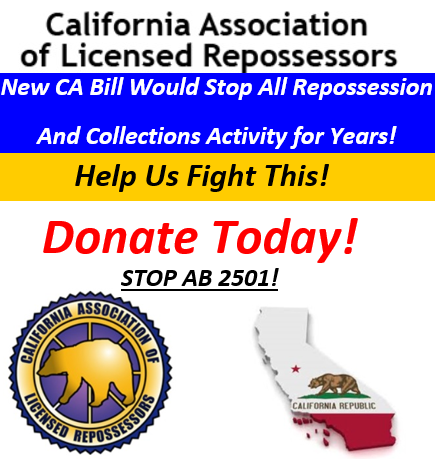
“AB 2501 Shifts the Cost of This Crisis onto the Private Sector, which will Limit Financial Opportunities in California and Create Job Loss.“ California Chamber of Commerce
19 May 2020 – In addition to the California Association of Licensed Repossessors (CALR) opposition to California’s state assembly bill 2501, titled the “COVID-19: homeowner, tenant, and consumer relief Law of 2020” an additional eight banking and credit union trade organizations have issued their own individual and joint written concerns. The bill is scheduled to face its first hurdle today as it is expected to come to vote in the states California House Banking and Finance Committee.
“Even when the 180 days expires, AB 2501 still limits the ability for these institutions to recover any loss payments from the consumer. Requiring these institutions to potentially go years without receiving payment is a significant burden that will negatively impact financial opportunities for Californians.”
The bill, which contains proposals that would create a moratorium on repossession, foreclosures during the COVID-19 period and an additional 180 days (6 months) after the “the emergency related to the COVID-19 disease has ended.” Was referred to by the California Chamber of Commerce as a “JOB KILLER”, was drafted and sponsored by the Committee Chair, Monique Limon (D) of Santa Barbara, has gained significant opposition from eight major state and national banking associations who issued a joint letter on May 17th expressing their concerns.
“While the legislation is well intended, it has the potential to cause significant disruptions in the mortgage markets, limit access to credit and lead to further unintended consequences for California customers.”
In a first letter to Chairwoman Limón, drafted May 14th by the American Financial Services Association (AFSA), they individually expressed their concern that AB 2501’s “Mandatory Indefinite Forbearance” would “create much confusion regarding their applicability to consumers already receiving forbearance under existing relief programs” and it’s “Extended Covered Period” would do dramatic damage to collateral value when “Vehicles that are ultimately repossessed after the legislative prohibition expires will flood the resale market, further reducing values. The burden of these falling prices would unfortunately fall on borrowers responsible for covering any resulting higher deficiency balances.”
On May 17th, a joint letter from the California Chamber of Commerce, American Bankers Association (ABA), American Financial Services Association (AFSA), Bank Policy Institute (BPI), Credit Union National Association (CUNA), Housing Policy Council (HPC), Mortgage Bankers Association (MBA) and the Securities Industry and Financial Markets Association (SIFMA) was also sent to Chairwoman Limón expressing their concerns that “AB 2501 would undermine these ongoing efforts to help customers by creating duplicative and sometimes contradictory requirements for the mortgage and auto finance industries when viewed alongside federal rules, regulations and program requirements established by Congress, regulatory bodies, federal executive agencies, and government sponsored enterprises.”
On a May 18th letter, the California Chamber of Commerce was more direct in referring to the bill as “JOB KILLER” and that “Requiring these institutions to potentially go years without receiving payment is a significant burden that will negatively impact financial opportunities for Californians. Given the financial risk this proposal creates for such institutions, there is no question that the institutions will limit the mortgage and auto loans it offers. There will likely be stricter criteria to qualify, or, higher rates to offset the potential loss these institutions could suffer under AB 2501. This limitation will have a negative impact on the housing market, further exacerbating the housing crisis and creating job loss in the housing industry. It will also unquestionably limit car loans, especially for those with problematic credit history, and will harm both consumers and workers in the auto industry.”
“As we have repeatedly stated, the private sector cannot be the safety net for this crisis. That is the role of government. While we will contribute to the recovery, the private sector cannot absorb the burdens proposed in AB 2501 without it causing further harm, including loss of jobs.”
The bill’s first hearing in committee clearly faces stiff opposition from the financial sector and even if does pass and go to the floor of the state legislature, could prove to be a political poison pill to anyone who votes for it. Despite it’s good intentions, the bill does nothing to prevent negative credit reporting and destroy consumer credit for many years to come. Credit that those most affected will very likely need in the future recovery period, will not be available except to those with already high credit scores (720+) as the result of a necessary tightening of the credit market. This limited access to credit would trickle down into auto dealership closures and reductions in staff for lending, further increasing the roles of the unemployed in the state of California.
This bill may still grow legs and require additional lobbying. While these large national and state associations have considerable clout, they do not represent the expressed interests of the repossession industry and your support of the California Association of Licensed Repossessors (CALR) lobby is still very much needed.











